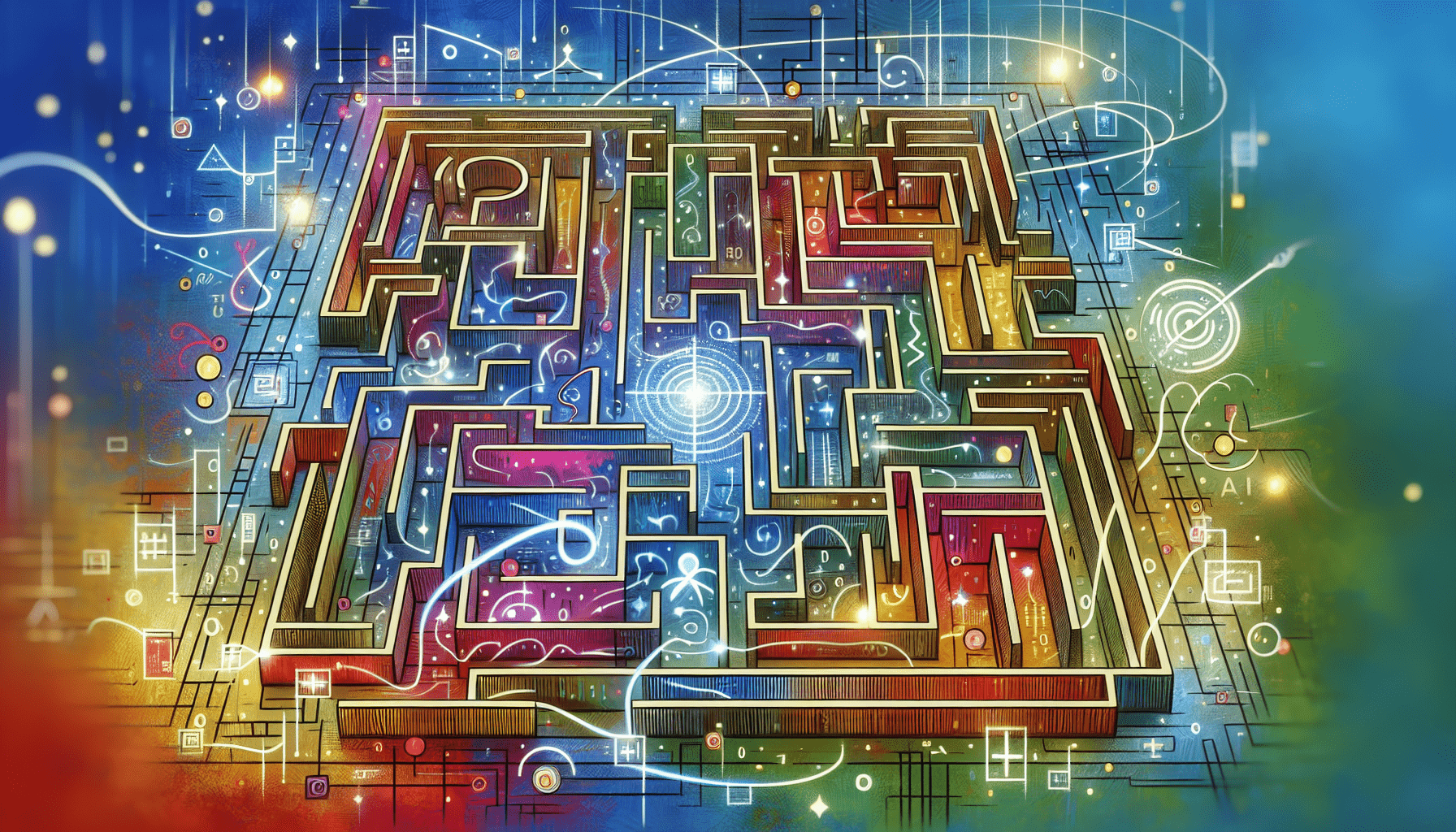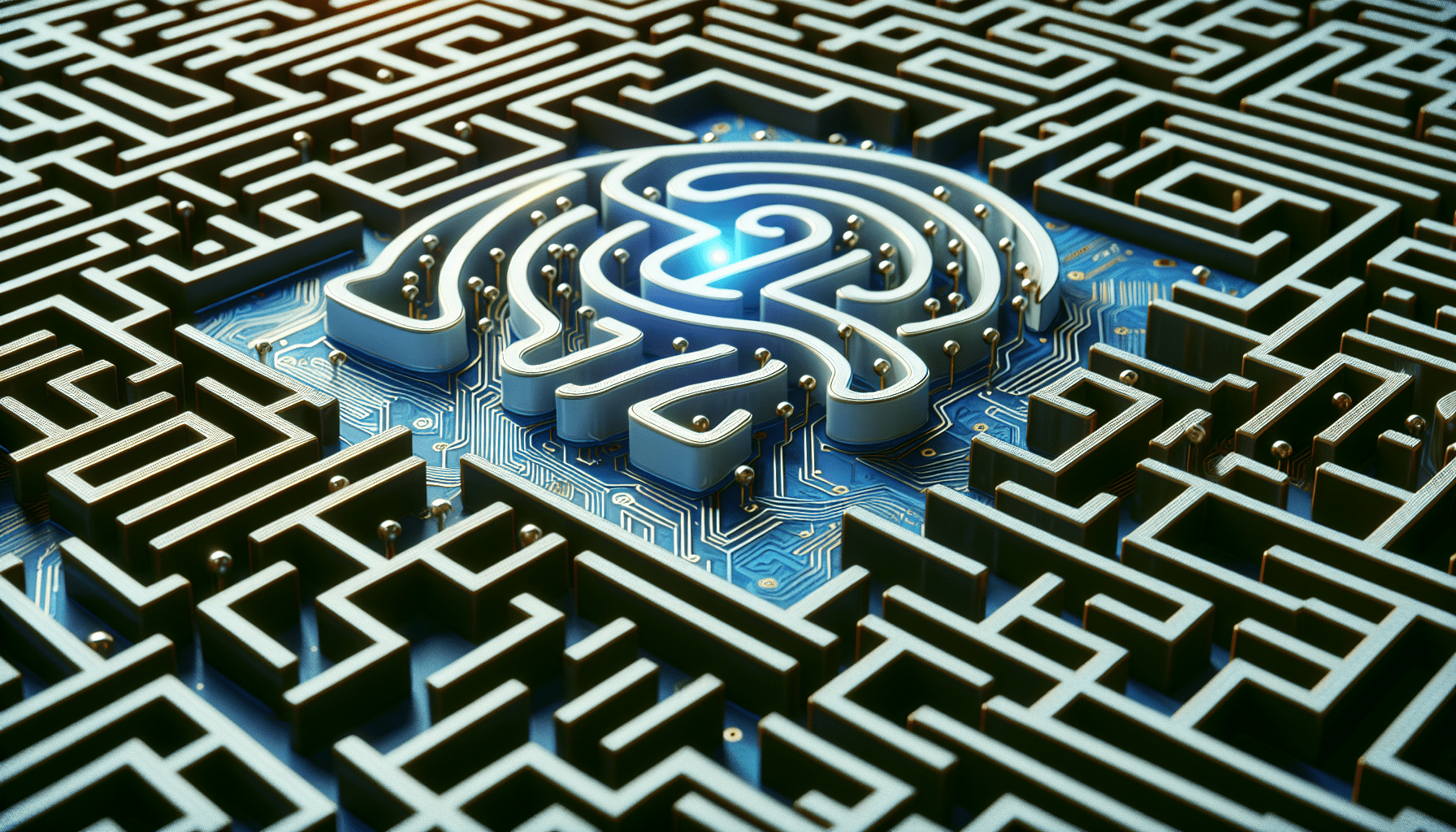Are you new to the world of Artificial Intelligence (AI) and feeling a bit overwhelmed by all the complex jargon and technical terms? Well, fear not! In this article, we will demystify AI and break it down in a way that even newbies can understand. From the basics of what AI is and how it works, to the various applications and potential impact it has on our daily lives, this article is your ultimate guide to unraveling the mysteries of AI. So, sit back, relax, and get ready to navigate the exciting world of AI with ease.

What is AI?
Definition of AI
AI, or Artificial Intelligence, refers to the development of computer systems that can perform tasks that typically require human intelligence. These systems are designed to mimic human cognitive functions, such as learning, problem-solving, and decision-making. AI aims to create intelligent machines that can perceive the environment, understand natural language, reason, and learn from data.
Different types of AI
There are several different types of AI, each with their own capabilities and limitations.
-
Narrow AI: Also known as Weak AI, it refers to AI systems that are designed to perform specific tasks, such as facial recognition or voice commands. Narrow AI is trained to excel in a specific domain but lacks the ability to understand or perform tasks beyond its predefined scope.
-
General AI: General AI, also called Strong AI, refers to AI systems that possess the ability to understand, learn, and perform any intellectual task that a human being can do. This type of AI can think, reason, and apply knowledge across different domains, exhibiting human-like intelligence.
-
Superintelligent AI: Superintelligent AI surpasses human intelligence and can outperform humans in any economically valuable work. Although still theoretical, developments in AI research and technology have brought discussions and debates about the potential risks and benefits associated with superintelligent AI.
Applications of AI
AI has found applications across a wide range of industries and sectors. Some notable applications include:
-
Healthcare: AI is used in medical imaging, diagnosis, drug discovery, and personalized medicine, enabling more accurate and efficient healthcare services.
-
Finance: AI algorithms are employed in algorithmic trading, fraud detection, and customer service automation, improving the efficiency and accuracy of financial processes.
-
Education: AI is utilized in adaptive learning platforms, intelligent tutoring systems, and automated grading, providing personalized and enhanced educational experiences.
-
Virtual Assistants: AI powers virtual assistants like Siri, Alexa, and Google Assistant, allowing users to interact with devices using natural language and perform various tasks, from setting reminders to controlling smart home devices.
-
Autonomous Vehicles: AI plays a crucial role in self-driving cars, enabling them to perceive the environment, make decisions, and navigate safely without human intervention.
History of AI
Early beginnings of AI
The concept of AI dates back to ancient times, with myths and legends featuring stories about artificially created beings. However, the modern development of AI began in the mid-20th century.
In 1956, the field of AI was officially established with the Dartmouth Conference, where a group of researchers aimed to develop “thinking machines.” During this period, symbolic AI was dominant, focusing on using symbols, rules, and logical operations to solve problems.
Development of AI in the 20th century
In the 1950s and 1960s, researchers made significant progress in AI. Programs like the Logic Theorist and the General Problem Solver showcased the potential of AI technologies. However, as the complexity of problems increased, these early AI approaches faced limitations in scaling and efficiency.
The 1980s marked a critical phase for AI development, known as the “AI winter,” as progress and funding for AI research declined. It was a time of disappointment and frustration due to overhyped expectations that AI would quickly achieve human-level intelligence.
Recent advancements in AI
In recent years, AI has experienced a resurgence, driven by advances in computing power and the availability of large amounts of data. This, coupled with breakthroughs in algorithms and the emergence of deep learning, has propelled AI into new territory.
Deep learning, a subset of machine learning, has revolutionized AI by enabling systems to process and learn from vast amounts of data. Deep neural networks, modeled after the human brain, have achieved remarkable results in image and speech recognition, natural language processing, and many other domains.
With the rapid progress in AI, the technology is now more accessible, affordable, and pervasive than ever before.
Key Concepts in AI
Machine Learning
Machine Learning (ML) is a subfield of AI that focuses on developing algorithms and statistical models that can enable computers to learn and make predictions or decisions without being explicitly programmed. Instead, ML algorithms learn from data, identify patterns, and make predictions or take actions based on what they have learned.
There are different types of machine learning algorithms, such as supervised learning, unsupervised learning, and reinforcement learning. Supervised learning involves training a model on labeled data, while unsupervised learning deals with unlabeled data, finding patterns and structure within the data. Reinforcement learning involves training an agent to take actions in an environment to maximize rewards.
Deep Learning
Deep learning is a subset of machine learning that focuses on training deep neural networks. These networks are composed of multiple layers of interconnected nodes, called artificial neurons, which mimic the structure and functioning of the human brain.
Deep learning has achieved remarkable success in various domains, including image and speech recognition, natural language processing, and autonomous vehicles. It has revolutionized AI by enabling systems to learn and make predictions from complex, unstructured data.
Natural Language Processing
Natural Language Processing (NLP) is a branch of AI that focuses on enabling computers to understand, interpret, and generate human language. NLP encompasses tasks such as language translation, sentiment analysis, chatbots, and voice recognition.
NLP algorithms use techniques such as machine learning, deep learning, and linguistic rules to extract meaning, understand context, and generate human-like responses. NLP has paved the way for advancements in virtual assistants, automated customer service, and language translation tools.
AI in Everyday Life
Virtual Assistants
Virtual assistants like Siri, Alexa, and Google Assistant have become ubiquitous in our everyday lives. These AI-powered applications use natural language processing and machine learning algorithms to interact with users, answer questions, play music, set reminders, and control smart home devices. Virtual assistants have made tasks more convenient and streamlined, providing a hands-free and personalized user experience.
Recommendation Systems
Recommendation systems are AI algorithms that utilize user data to provide personalized recommendations. These systems can be found in e-commerce platforms, streaming services, and social media platforms. By analyzing user preferences, purchase history, and online behavior, recommendation systems suggest products, movies, songs, or content that the user is likely to be interested in. This enhances the user experience, increases engagement, and drives customer satisfaction.
Autonomous Vehicles
Autonomous vehicles, also known as self-driving cars, rely heavily on AI technologies. They utilize sensors and AI algorithms to perceive the environment, make decisions, and navigate without human intervention. Autonomous vehicles have the potential to revolutionize transportation by improving safety, reducing traffic congestion, and enhancing mobility for people with disabilities. The development of AI-powered autonomous vehicles is a major step towards a future with smart transportation systems.

Ethical Considerations in AI
Bias and fairness
AI systems are only as good as the data they are trained on. If the training data is biased, it can lead to biased outcomes and discriminatory decisions. For example, biased algorithms used in hiring processes can perpetuate gender or racial biases. Ensuring fairness and mitigating bias in AI systems is crucial to avoid perpetuating societal inequalities. Efforts are being made to develop algorithms that are more transparent, accountable, and fair.
Privacy concerns
AI systems often require access to large amounts of personal data to function effectively. This raises concerns about privacy and data security. There is a need for robust regulations and ethical frameworks to protect user privacy and prevent misuse of sensitive data. Data protection measures such as anonymization, encryption, and user consent are vital to safeguard individual privacy rights.
Potential job displacement
As AI technologies advance, there is growing concern about the potential impact on employment. Automation enabled by AI may lead to job displacement in certain sectors. However, AI also has the potential to create new job opportunities, particularly in the areas of AI development, data analysis, and human-AI collaboration. Preparing the workforce for the future of work, upskilling and reskilling programs, and ensuring a smooth transition to an AI-driven economy are important considerations.
AI and the Future of Work
Impact on various industries
AI is poised to have a transformative impact on various industries. From healthcare to agriculture, retail to finance, AI has the potential to optimize processes, improve efficiency, and drive innovation. In healthcare, AI-powered tools can assist doctors in diagnosis, drug discovery, and personalized medicine. In finance, AI algorithms enable faster and more accurate trading decisions. The possibilities are vast, and industries need to adapt and embrace AI to stay competitive.
New job opportunities
While AI has the potential to automate certain tasks, it also creates new job opportunities. The development, deployment, and maintenance of AI systems require skilled professionals in AI research, data science, and software engineering. Moreover, as AI systems become more prevalent, there will be a demand for human-AI collaboration to ensure the ethical and responsible use of AI technologies. Human skills such as critical thinking, creativity, and empathy will continue to be highly valuable in an AI-driven world.
Skills needed for the future
As AI continues to advance, there is a growing demand for individuals with skills in AI and related disciplines. Data science, machine learning, and programming are essential skills for those who want to work with AI technologies. Additionally, skills such as problem-solving, adaptability, and collaboration are highly valuable in an AI-driven economy. Continuous learning and staying up-to-date with the latest developments in AI are crucial for individuals seeking to thrive in the future of work.

AI in Healthcare
Medical diagnosis and imaging
AI has shown great potential in improving medical diagnosis and imaging. Machine learning algorithms can analyze medical images, such as X-rays, MRIs, and CT scans, to assist doctors in detecting abnormalities and making accurate diagnoses. AI algorithms can help reduce errors, improve efficiency, and enable better patient outcomes in healthcare settings.
Drug discovery and development
AI is revolutionizing the pharmaceutical industry by aiding in drug discovery and development. AI algorithms can analyze vast amounts of biological data, identify patterns, and predict the efficacy of potential drug candidates. This accelerates the drug discovery process, reduces costs, and increases the chances of finding effective treatments for various diseases.
Personalized medicine
AI-driven technologies have the potential to bring about personalized medicine. By integrating patient-specific data, such as genetic information, medical history, and lifestyle factors, AI algorithms can assist in tailoring treatment plans and predicting disease risks. This approach allows for more precise and targeted healthcare interventions, improving patient outcomes and reducing healthcare costs.
AI in Finance
Algorithmic trading
Algorithmic trading, also known as automated trading, utilizes AI algorithms to execute trades at high speeds and frequencies. AI algorithms analyze market data, identify patterns, and make trading decisions based on predefined rules. Algorithmic trading has the potential to increase efficiency, reduce human errors, and optimize investment strategies in financial markets.
Fraud detection
AI plays a crucial role in fraud detection in the financial industry. Machine learning algorithms can analyze large volumes of transaction data, identify suspicious patterns, and detect fraudulent activities. AI-powered fraud detection systems enhance security, protect customer assets, and minimize financial losses.
Customer service automation
AI-powered chatbots and virtual assistants are transforming customer service in the finance industry. These AI systems can understand and respond to customer queries, assist with account management and transaction inquiries, and provide personalized financial advice. Customer service automation enables fast and efficient support, contributing to improved customer satisfaction and reduced service costs.

AI in Education
Adaptive learning platforms
Adaptive learning platforms utilize AI technologies to tailor educational content and learning experiences based on individual student needs. These platforms track student progress, identify areas of strengths and weaknesses, and provide personalized recommendations and feedback. Adaptive learning promotes individualized learning, improves engagement, and enhances educational outcomes.
Intelligent tutoring systems
Intelligent tutoring systems (ITS) are AI-powered educational tools that provide personalized instruction and support to students. ITS track student performance, identify misconceptions, and provide targeted feedback to facilitate mastery of the subject matter. These systems enhance student learning, enable self-paced studying, and offer adaptive and individualized instruction.
Automated grading
AI-powered tools can automate the grading and assessment process, saving teachers valuable time and effort. These tools utilize machine learning algorithms to analyze student responses and assess the correctness and quality of their work. Automated grading systems provide quick and consistent feedback, allowing teachers to focus on other aspects of instruction and student support.
Challenges and Limitations of AI
Data quality and availability
AI algorithms rely heavily on data for training and decision-making. The quality, quantity, and diversity of training data significantly impact the performance and accuracy of AI systems. Obtaining high-quality data can be challenging, as it requires careful curation, cleansing, and validation. Additionally, data availability can be a limitation in certain domains, limiting the development and applicability of AI technologies.
Lack of transparency and interpretability
AI algorithms often operate as black boxes, making it challenging to understand and interpret their decision-making processes. Lack of transparency can raise concerns about accountability, bias, and potential ethical issues in AI systems. Researchers are actively working on developing explainable AI techniques to enhance transparency and enable users to understand and trust AI systems.
Ethical dilemmas
AI introduces ethical dilemmas and questions regarding the responsible use and impact of AI technologies. It raises concerns about privacy, bias, job displacement, and the potential for misuse of AI systems. Establishing ethical frameworks, regulations, and guidelines is crucial to ensure the ethical development, deployment, and use of AI to benefit society as a whole.
In conclusion, AI has emerged as one of the most exciting and rapidly advancing fields in technology. With its diverse applications, AI is transforming various industries and everyday life. Understanding the key concepts, advancements, and ethical considerations in AI is essential in leveraging its potential while ensuring responsible and ethical development and use. As AI continues to advance, it promises to shape the future of work and open up new opportunities for innovation and growth.







Leave a Reply